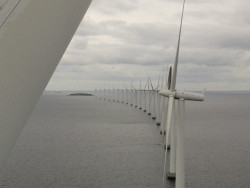Making waves in offshore wind
Renewable power is essential for Europe to meet energy demand and reduce carbon emissions. Offshore wind offers many advantages over other forms of renewable energy, including high yield of power and lack of disruption to landscapes or noise pollution. High Voltage Direct Current (HVDC) will be the key technology for integrating offshore wind power into AC (alternating current) main grids and for interconnecting European countries’ AC grids. HVDC transmission offers efficient transmission of large amounts of power over long distances. Plans for the interconnection of multiple renewable power sources, loads and AC grids through DC technologies are leading to the exciting transmission concept of HVDC grids. If Europe is to take advantage of the environmental and economic opportunities offered by offshore wind power, HVDC grids and of the significant potential for the creation of a European energy ‘Supergrid’, research expertise, both in the private sector and in universities and research institutes, must be developed. The primary aim of MEDOW has therefore been to train talented young researchers within a multi-disciplinary network of top academic and research-focused industrial organisations across Europe and in China. This ‘training through research’ has equipped them with the expert knowledge, tools and skills to leave the project as highly employable researchers ready to embark on successful careers with impact and to contribute to Europe’s future society, economy and environment. Project funds from the European Commission supported researchers’ salaries, training and dissemination activities. Researchers communicated their results within the scientific community through over 25 articles in international peer-reviewed journals, over 75 presentations at international conferences and workshops, in 5 book chapters and 1 patent application. They made over 30 presentations to various power systems and offshore wind power industry bodies. A substantial outreach schedule, with over 30 outreach activities, aimed to communicate MEDOW beyond the power grids research community. Training funded by the project for MEDOW and other researchers included: a visit to a wind turbine manufacturing plant, a Wind Power summer school, lectures from high profile Visiting Scientists of international standing in their field and a visit to an offshore wind. The network’s second aim was to make meaningful research progress and generate new knowledge in DC grids and offshore wind power. Research activities and achievements include: • Determination of DC grids suitable for offshore wind power and of characteristics of necessary converters; • Development and use of a digital wind farm model for testing variable configurations and topologies; • Development and validation of 2-Level and half-bridge and full-bridge modular multilevel converter (MMC) models; • Analysis of DC grid faults and development of DC protection algorithms and post-fault restoration schemes; • Investigation of the effects of DC grid faults on AC transmission power protection with high penetration of DC grids. Validation and testing of the outcomes in a closed-loop test with RTDS simulator, power amplifier and a commercial AC transmission relay; • Design, development and testing of the prototype so-called Ultra-Fast Solid-State DC Circuit Breaker; • Application for patent protection for a ‘Fault Current Managing Branch for Surge-less current interruption in DC System’; • Analysis of interactions between offshore wind farms and AC power systems with the objective of providing ancillary services; • Determination of adverse interactions of HVDC converters with AC systems in the sub-harmonic (SSR) frequency domain and controller induced resonances at higher frequencies; • Investigation of HVDC grid behaviour in the presence of AC faults; The website is a repository of public information about the project’s results and activities: www.medow.engineering.cf.ac.uk
Keywords
renewable energy, offshore wind, HVDC, offshore grid, supergrid, interconnections, transmission, marine renewables
Countries
Belgium, China, Denmark, Spain, Portugal, United Kingdom



